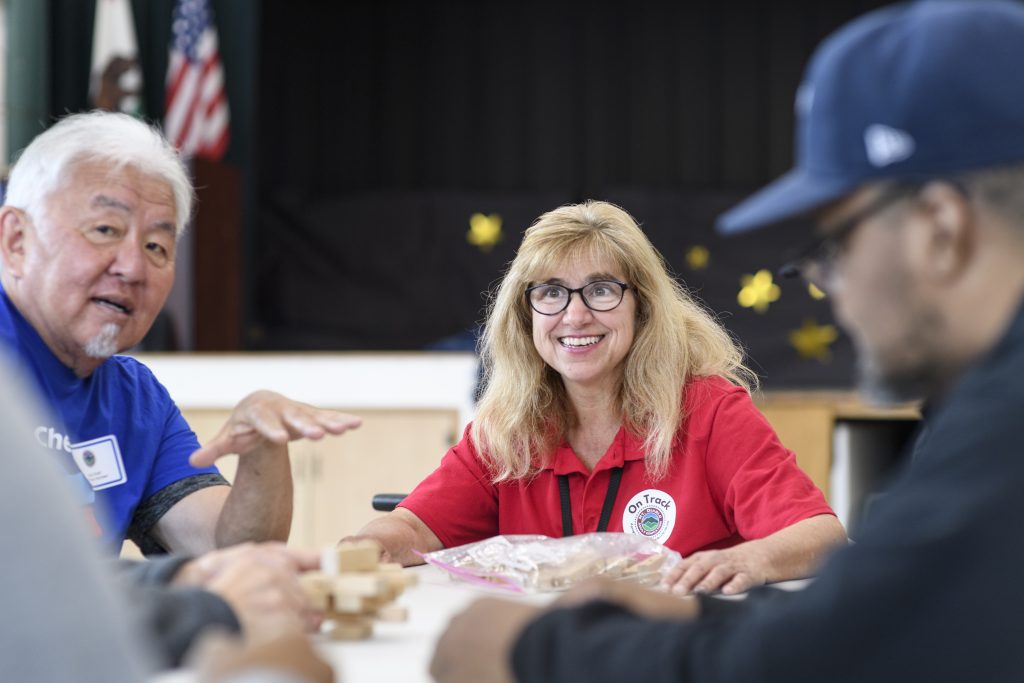A suite of services give adults with disabilities a richer, brighter outlook

Karen Lingenfelter (center) is the program coordinator for Mt. Diablo Adult Education’s Adults with Disabilities (AWD) program, which serves 89 students in three programs, which help them set and achieve goals like finding employment, living independently or attending college. Photo by George Baker
In 1986, a group of parents worried for their children’s future joined forces to make a plan: Their children—all with disabilities—were aging out of the K-12 system with no programs to continue their education or services to help them live an independent life.
“They didn’t know what their kids were going to do, so they started a program at a church recreation room in Concord, and asked if an adult school teacher could come and do some classes,” says Karen Lingenfelter, program coordinator for Mt. Diablo Adult Education Adults With Disabilities (AWD) program. “Eventually we took over the program and it became our Life Skills program and moved to our adult school, Loma Vista Adult Center.”
Today, the AWD program serves 89 students in three programs designed to help them set and achieve goals like finding employment, living independently or attending college.
MDAE also offers standard adult school programs for all adult learners, including English as a second language (ESL), career technical education (CTE), basic and secondary education and high school diploma and equivalency classes, as well as Parent Education and Lifelong Education classes.
“It takes a village for our students to achieve what they want to achieve.”
Karen Lingenfelter, Coordinator, Mt. Diablo Adult Education’s Adults With Disabilities Program
The school’s Life Skills program serves students aged 22 or older with intellectual or developmental disabilities. The classes and activities teach independent living skills to help students prepare for living and working in the community. Skills development in social/ communication skills, healthy relationships, community safety, home care and management, budgeting, and work preparedness skills, support students in achieving their personal life goals.
“It is preparing folks for the greatest level of independence they can achieve in the community where they live, leading to a healthy, full, and well-rounded life,” Lingenfelter says.
Likewise, Mt. Diablo’s On Track program, founded in 1996, has supported adults with brain injuries reintegrating back into their community but who aren’t yet ready to return to work or school. Lingenfelter says there’s a critical need for such programs because they teach students how to relearn skills and develop strategies to retrain or return to work, and build independence.
“We help them after they’ve exhausted most if not all of their medical coverage and therapies, and then we pick up by helping them with skills such as; improving memory, reasoning, planning, execution of tasks, problem-solving and interacting with others,” she says.
The program also assists with preparing for a return to work, she adds, whether it’s back to the industry in which they once worked or, if necessary, something new.
“It’s almost like recreating who you are and what your life is going to be like moving forward,” Lingenfelter says.
Another critical MDAE offering is its Transition Options Program (TOPS), which supports students who are on the autism spectrum or who have related disorders and struggle with social/communication skills, executive functioning skills, and managing stress and anxiety.
“We’re helping students transition to the next phase of life, which may be a college degree or certificate, maybe it’s a trade school, or maybe it’s going toward employment,” Lingenfelter says. “We have a larger group of 18 to mid-20 year olds, but we also have students in their late 40s and early 50s who have degrees, but due to social challenges and/or anxiety they’ve had difficulty successfully transitioning to employment.”
AWD students also have the opportunity to work alongside staff at the Embassy Suites Hotel in Walnut Creek. This is a paid internship program in partnership with California’s Department of Rehabilitation, the Regional Center of the East Bay and VistAbility (supported employment organization) through MDAE’s Workplace Essential Skills soft skills training program. This allows them to learn essential career skills while earning a paycheck. The AWD staff also plans to launch another paid internship program, which will place students in local businesses while providing essential instruction in workplace skills while they gain marketable work skills.
Lingenfelter says that while the programs are expensive to run, benefits extend beyond individual students. Many students’ goals are to work or get back to work and not rely solely or at all on Supplemental Security Income (SSI) or Social Security Disability Insurance (SSDI). MDAE also partners with its local chamber of commerce, workforce development board, America’s Jobs Center of California, and HireAble to connect job seekers with employers.
“It takes a village for our students to achieve what they want to achieve,” Lingenfelter says. “We can’t do it alone, and families need support as well.”
In 2008, funding cuts to adult education left many schools facing severe funding shortages. Many AWD programs were eliminated or trimmed, and were never restored. Lingenfelter notes many nonprofits shuttered during the pandemic. She credits MDAE’s administration with recognizing the program’s importance. Today, it’s the only adult school in the state with an accredited program for adults with brain injuries.
“These programs are vital to our communities. We are supporting a large group of folks throughout our county who, with support and education, can be living, working and enjoying life at the level that everyone deserves,” Lingenfelter says. “For many who are able to work and become more self-sufficient, it helps everybody, it helps our society, it helps our community.”
For more information on Mt. Diablo Adult Education’s Adults with Disabilities On Track Program visit https://mdae.mdusd.org/programs/awd
Written by Anne Stokes
| Regions | Classes & Topics |
|---|---|
| Bay Area California | Variety of Classes |